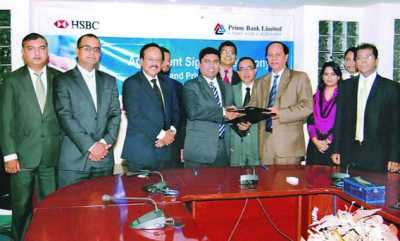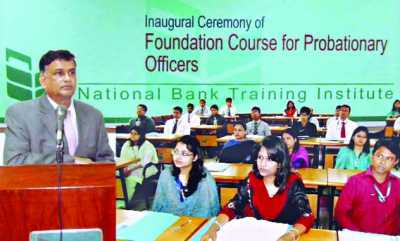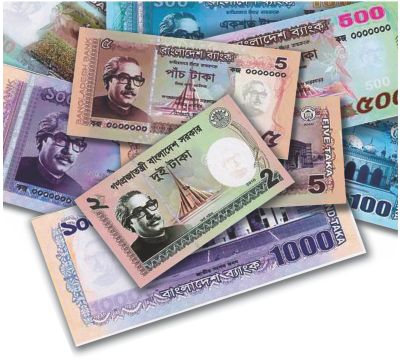Banking
Prime Bank signs deal with HSBC
 Quazi ASM Anisul Kabir, Deputy Managing Director and Chief Operating Officer of Prime Bank Ltd, and Ahmed Saiful Islam, Chief Operating Officer of HSBC, exchange documents at the bank's head office in Dhaka Wednesday.
Quazi ASM Anisul Kabir, Deputy Managing Director and Chief Operating Officer of Prime Bank Ltd, and Ahmed Saiful Islam, Chief Operating Officer of HSBC, exchange documents at the bank's head office in Dhaka Wednesday.
Prime Bank Limited has signed an agreement with HSBC on cash collection services.
As per the deal, the clients of HSBC will be able to use all the 121 footsteps of PBL across the country for collecting money of HSBC's Cash Management Customers, said a press release.
Quazi ASM Anisul Kabir, Deputy Managing Director and Chief Operating Officer of PBL and Ahmed Saiful Islam, Chief Operating Officer of HSBC signed the agreement on behalf of their respective organisations at a function at the bank's head office in Dhaka Wednesday.
News: The Daily Sun/Bangladesh/06-Sep-12
NBL organises foundation training course
 Neaz Ahmed, Managing Director and CEO of National Bank Ltd, addresses inauguration of a training course for probationary officers of the Bank at the Bank's training institute in Dhaka.
Neaz Ahmed, Managing Director and CEO of National Bank Ltd, addresses inauguration of a training course for probationary officers of the Bank at the Bank's training institute in Dhaka.
A five-week foundation training course for probationary officers of National Bank Limited (NBL) was organised at the Bank's training institute.
Thirty-five probationary officers of the Bank participated at the training course, said a press release.
Neaz Ahmed, Managing Director and CEO of the Bank attended the inaugural ceremony of the programme as chief guest.
He advised the officers to acquire professional knowledge on banking and leadership qualities to shoulder the management responsibilities of the Bank in future.
News: The Daily Sun/Bangladesh/06-Sep-12
MCCI condemns Sonali Bank scam
The Metropolitan Chamber of Commerce and Industry yesterday condemned the complete disregard for banking regulations that led to a large-scale scam involving Sonali Bank Ltd and its customer Hall-Mark Group.
"The loan scam of Sonali Bank, the largest of the country's state-owned banks, has come as a rude shock to us," MCCI said.
Dishonesty of bankers and lax management of banks that resulted in the global financial crisis of 2008-2009, shutting down many banks in the developed world, should have been a lesson for Bangladesh Banks, MCCI said.
"The business community is deeply concerned at the disclosure that a single branch of Sonali Bank extended unauthorised loans worth Tk 36.06 billion to five business houses in total disregard of the banking sector rules and regulations.”
“Of this amount, Tk 26.68 billion was lent to a single borrower.”
Blaming weak governance and non-prudent supervisory mechanism of the Bank for such long-term irregularities, MCCI expressed concerns over the inefficiency of regulatory bodies responsible for monitoring the activities of the Bank and the banking sector.
“We also wonder how, despite the information of irregularities reportedly supplied by its internal auditors to the branch management and subsequent warnings of Bangladesh Bank, such big amounts could be unlawfully lent by the Bank branch without being noticed by the higher administration and the board of directors of the Bank,” it said.
The chamber expressed happiness with the parliamentary standing committee on the finance ministry that set up a panel to look into the loan scam and appreciated steps taken by the Bangladesh Bank and Anti-Corruption Commission.
MCCI backs complete independence of the central bank to properly play its regulatory role in the banking sector.
The chamber appreciated the encouragement the finance minister's gave to the business community by saying that the Sonali Bank scam will not have an adverse effect on the banking sector.
MCCI urged the government to unearth and punish the irregularities of the Bank officials and some vested quarters of the business community, recover the scammed amount from defaulters, and enforce transparent and efficient governance of banks to prevent any such scandal in future.
News: The Daily Star/Bangladesh/06-Sep-12
Monetary policy's prime target: growth or inflation?
 While monetary policy is regarded as the most important economic guideline in developed countries, it is treated as a complementary promise to fiscal policy in most developing countries. In Bangladesh, the scenario is even worse. Here the finance minister, as a fiscal-policy leader, dictates explicitly what Bangladesh's monetary policy should be -- exhibiting the total absence of monetary-policy independence.
While monetary policy is regarded as the most important economic guideline in developed countries, it is treated as a complementary promise to fiscal policy in most developing countries. In Bangladesh, the scenario is even worse. Here the finance minister, as a fiscal-policy leader, dictates explicitly what Bangladesh's monetary policy should be -- exhibiting the total absence of monetary-policy independence.
Bangladesh Bank, as the central bank of the country, announced its monetary policy in July this year as it does every year. Interestingly, the central bank's restrained stance on monetary policy this July was no surprise, because the finance minister had clearly signalled the stance of the upcoming monetary-policy in his budget speech that was made public in June. The finance minister explicitly declared that the upcoming monetary policy will be 'restrained,' making the monetary-policy statement simply a 'compliance report' by the central bank. While the influence of the government on the central bank is well known, particularly in developing countries, this type of predetermination lacks respect to the monetary authority, and is never seen in neighbouring countries such as India and Pakistan.
Given the coverage of its operation, the central bank is the most powerful economic institution even in a developing country like Bangladesh. For example, the amount of banking-sector loans is almost 52 percent of total national output, whereas the fiscal budget covers only 18 percent of national income. Of course, that 18 percent is very crucial to mobilising outstanding loans of 62 billion dollars, but it must not be ignored that the central bank plays a gigantic role in growth by involving the largest segment of national workforce of the economy. As the monetary-policy statement of 2012-2013 asserts, the two main objectives of the central bank include controlling inflation and fostering economic growth. This dual mandate of Bangladesh Bank becomes hard to accomplish when the finance ministry targets high growth but low inflation. High growth is often inflationary and high inflation is always detrimental to growth. In the last fiscal year, Bangladesh had achieved economic growth of 6.4 percent, while inflation was slightly above 10 percent. For the fiscal 2012-2013, the government aims at achieving growth of 7.2 percent but targets inflation at 7.5 percent, making the task of the central bank tougher than before. Since moderate inflation is the prime goal of any monetary policy, Bangladesh Bank is left with no option but to adopt a restrained monetary policy that limits broad-money growth to 16 percent and reserves money growth to 14.5 percent for fiscal 2013.
The government's excessive influence on the central bank is a sign of authoritarian economic management that contradicts public policy on deregulation and the market economy. We have a bad tradition of seeing the central bank as an accommodating institution to fiscal desperation that usually originates from short-term political priorities. That is why money supply grows so fast in Bangladesh and hence inflation hovers over the double-digits. This tradition must be changed. The central bank must be empowered with greater monetary policy independence to bridle inflation and ensure macro-stability to eventually stimulate growth.
If money-velocity growth is assumed to be constant and economic growth turns out to be 7 percent, money growth of 16 percent will bring inflation down to around 9 percent, which is still above the targeted inflation of 7.5 percent. Hence, money supply must be more conservative than it is now, but that stance may reduce the growth of private credit, which again will lower economic growth. Thus, Bangladesh Bank is forced to operate in a difficult zone when inflation is already of double digits.
The scenario becomes even worse when the government spells out a long-term inflation rate of 5 percent in the budget speech of 2012-2013. We are not sure where this magic number of 5 percent comes from, but we are sure that the government wants moderately low inflation for the long run to make economic growth sustainable. If that is the case, Bangladesh Bank must continue its conservative stance on money growth until inflation drops down to 5 percent. Neither reserve-money growth of 14.5 percent nor broad-money growth of 16 percent looks conducive to long-term inflation of 5 percent. Money growth should fall below 15 percent in a gradual fashion, and that might temporarily lower output growth.
We have to accept this tradeoff to make Bangladesh Bank function as per long run goals of macro-stability and sustainable growth. Then monetary policy surely requires independence. Various studies show that a higher degree of monetary-policy independence is associated with a lower inflation across the globe. The government's expectations on Bangladesh Bank are too high to accomplish. It wants that the central bank will kill two birds with one stone every time. If low inflation is a priority, as it should be the case for the sake of sustainable growth, the government has to compromise on ambitious growth targets at least in the short run.
Inflation tormented the global economy over the 1970s. Paul Volcker, the Federal Reserve chair, realised that controlling inflation must be the first priority for a central banker. He tightened money supply to an extreme point even knowing that it will lower output growth. America experienced its first manmade recession in history in the early 1980s, but the scenario eventually took a positive turn. Not only did inflation come under control, but the US economy also entered the long boom for 17 years until the end of the 1990s.
Volcker was able to accomplish his goals in a sequential fashion because he could work independently. He shot one bird at a time without any concession to inflation. Time has come for our central bank to act first on inflation in the similar fashion. Are we ready to make our governor accountable directly to people and parliament, rather than compliant to the fiscal desperation? The central bank, the main anchor of the economy, must work independently to ensure macro-stability and respectable growth in an emerging economy.
The writer is an associate professor of economics at the State University of New York at Cortland. He can be reached at biru.paul@cortland.edu.
News: The Daily Star/Bangladesh/06-Sep-12
Awaal new DMD of Agrani Bank
 Mohammad Awaal Khan
Mohammad Awaal Khan
Mohammad Awaal Khan recently joined Agrani Bank as Deputy Managing Director.
Prior to his new assignment, Awal was general manager of Sonali Bank, Rajshahi Krishi Bank and Bangladesh Krishi Bank, said a press release Monday.
After obtaining MCom in Finance from Dhaka University, he joined Bangladesh Krishi Bank as a probationary officer in 1982.
He attended different training courses and seminars at home and abroad.
News: The Daily Sun/Bangladesh/05-Sep-12



